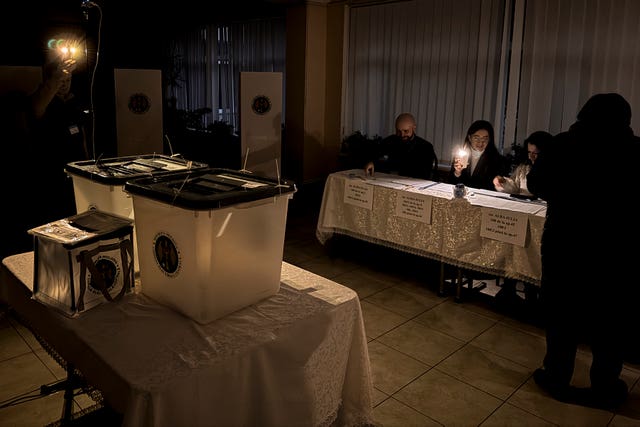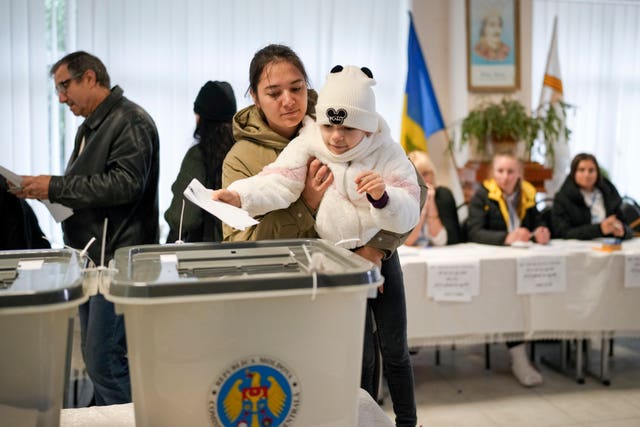Moldovan president seems on track to win first polls, EU vote could be rejected
Ballots cast among the country’s large diaspora were still being tallied and tend to favor the EU path.

Moldova’s pro-Western president looks set to win the first round of a presidential race but has accused “criminal groups” of undermining a referendum on European Union membership.
Nearly 95% of votes were counted in the EU referendum that asked voters to choose whether to enshrine in the country’s constitution a path toward the EU. About 52% of a total of 1.2 million ballots voted “no,” while 47% voted “Yes.”
However, ballots cast among the country’s large diaspora were still being tallied and tended to favour the EU path.
“Criminal groups, working together with foreign forces hostile to our national interests, have attacked our country with tens of millions of euros, lies and propaganda, using the most disgraceful means to keep our citizens and our nation trapped in uncertainty and instability,” said president Maia Sandu after about 90% of the votes had been counted.

“We have clear evidence that these criminal groups aimed to buy 300,000 votes — a fraud of unprecedented scale,” Ms Sandu added.
“Their objective was to undermine a democratic process.”
Polls by WatchDog, a Chisinau-based think tank, show a clear majority of more than 50% support the EU path.
The referendum needs a one-third turnout to be valid.
If Ms Sandu fails to win an outright majority on Sunday, a run-off will be held on November 3 which could pit her against Alexandr Stoianoglo, a Russia-friendly former prosecutor general who is polling at around 10%.
The two pivotal ballots are being held amid ongoing claims by Moldovan authorities that Moscow has intensified an alleged “hybrid war” campaign to destabilise the country and derail its EU path.
The allegations include funding pro-Moscow opposition groups, spreading disinformation, meddling in local elections, and backing a major vote-buying scheme.
US national security spokesman John Kirby echoed those concerns this week, saying in a statement that “Russia is working actively to undermine Moldova’s election and its European integration”. Moscow has repeatedly denied it is interfering in Moldova.

“In the last several months, Moscow has dedicated millions of dollars to influencing Moldova’s presidential election,” Mr Kirby said.
“We assess that this money has gone toward financing its preferred parties and spreading disinformation on social media in favour of their campaigns.”
In early October, Moldovan law enforcement said it had uncovered a massive vote-buying scheme orchestrated by Ilan Shor, an exiled pro-Russia oligarch who currently resides in Russia, which paid 15 million euros (£12.5 million) to 130,000 individuals to undermine the two ballots.
Mr Shor, who was sentenced in his absence last year to 15 years in jail for fraud and money laundering in the case of 1 billion US dollars (£766 million) that went missing from Moldovan banks in 2014, denied the allegations, saying “the payments are legal” and cited a right to freedom of expression.
His populist Russia-friendly Shor Party was declared unconstitutional last year and banned.
On Thursday, Moldovan authorities foiled another plot in which more than 100 young Moldovans received training in Moscow from private military groups on how to create civil unrest around the two votes.

Some also attended “more advanced training in guerrilla camps” in Serbia and Bosnia, police said, and four people were detained for 30 days.
A pro-Western government has been in power in Moldova since 2021, a year after Ms Sandu won the presidency, and a parliamentary election will be held next year.
Moldova, a former Soviet republic with a population of about 2.5 million, applied to join the EU in the wake of Russia’s full-scale invasion of Ukraine on February 24 2022, and was granted candidate status that summer, alongside Ukraine.
Brussels agreed in June to start membership negotiations.





